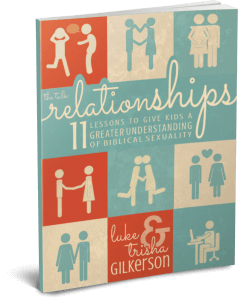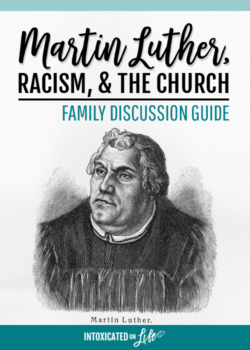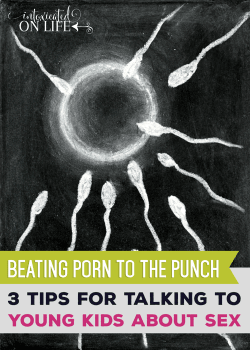The young boy sat in his room filled with embarrassment. His mom recently found “evidence” of masturbation while doing the laundry, and she told him his father would talk to him more when he came home from work. Dad quietly knocked on the door, and upon entering, handed his son a small book about “becoming a man.” All he said was, “Your mother thought you should read this.” He quickly turned and left the room.
That was the extent of “the talk” this boy got during his young teenage years.
Sadly, that may be more than a lot of kids got from their parents. Among the thousands of Christian adults I’ve spoken to, I’ve met very few who have told me their parents made a good effort to teach them about sex.
We see similar problems in the world at large.
- One New York University study found only about half of parents ever talk to their teens about their sexual values, like waiting until marriage.1
- In another survey, only 38% of young women and 25% of young men said they had ever received good advice from their parents that helped them talk about sexual issues with a girlfriend or boyfriend.2
Despite this, the studies on this are clear: when parents engage in open, repeated, confident, and comfortable discussions about sex and relationships, their teens are not only less likely to engage in sexually risky behavior, but are more likely to have a closer relationship to their parents overall.3
If I could offer just a few bits of advice for Christian parents, here are 3 sentiments we wish our parents would have said to us about sex…
1. “I want you to think about sex.”
Australian author Francis Sheed said,
“The typical modern man practically never thinks about sex. He dreams of it, of course, by day and by night; he craves for it; he pictures it, is stimulated or depressed by it, slavers over it. But this frothing, steaming activity is not thinking…[T]hinking about sex means striving to see sex in its innermost reality and the function it is meant to serve.”
We say we live in a world that has “sex on the brain.” Movies and TV shows constantly draw attention to the idea of physical and sexual attraction, or even show graphic displays of sexuality. Many popular songs are sung about people’s desires to have sex or how lonely they are without it. Magazine covers constantly draw attention to the physical form.
But Sheed’s point is that none of this is really “thinking” deeply about sex. Thinking about sex is about understanding why God made it. It means being intentional about developing a robust “theology of sex.”
And it is during the pre-teen and teenage years parents can take conversations about sex to a deeper level.
2. “Sex is powerful but it is also very good.”
Morally conservative parents often stress the power of sex: its ability to create life, its ability to transmit inflections, the way it spiritually bonds us to another person. All very important truths to communicate.
But if we talk only of the power of sex but deny or ignore its goodness, then we are not presenting a biblical picture of sex. The Bible is frank and unabashed when it comes to the original goodness of sexual desire.
When parental communication about sex is always moralistic in tone, this only encourages secrecy.4 Pre-teens and teens need to understand that before mom and dad were parents, they were lovers. They need to understand the Bible’s commands about sex are based on its goodness and power—they do not stem from a prudish suspicion of sexual desire.
3. “Running from sexual temptation means running to something better.”
Sexual desires can easily lead us astray, and while teens need to know the danger of unchecked sexual passion, they need to understand God is not the enemy of pleasure.
In Ephesians 5, in the midst of one of the apostle Paul’s most scathing rebukes of sexual sin, he does not merely call Christians to “purity.” Read his remarks carefully…
“But sexual immorality and all impurity or covetousness must not even be named among you, as is proper among saints. Let there be no filthiness nor foolish talk nor crude joking, which are out of place, but instead let there be thanksgiving.” (Ephesians 3:3-4)
The opposite of impurity is not just purity. It is gratitude. Truly joyful people are much more difficult to tempt. When we are delighting in all God is and all He gives, we are far less likely to look for satisfaction in sin.
Temptation can easily strike us when we are discontent, when all we focus on are the things we lack. During the pre-teen and teenage years, it is easy to get obsessed with things you don’t like about yourself or about your life. You can easily get discontent with parents, school, the way your body looks, friendships, and romantic relationships (or lack thereof). At times like this, it is easy to get sucked into fantasy because it offers a parody of intimacy, or to get drawn into sexual activity because it offers us pleasure in the midst of our pain.
A thankful person doesn’t see God as a cosmic killjoy but a God who has “pleasures forevermore” at his right hand. Parents who give their teens this vision of God show them that sin is the enemy of pleasure.
Teaching Pre-Teens and Teens About Godly Relationships

This is why my wife and I wrote Relationships: 11 Lessons to Give Kids a Greater Understanding of Biblical Sexuality. This book is for parents to read-aloud with their 11- to 14-year-olds. The book is designed to…
- encourage kids to think rightly about sex in a world that is filled with lies about sex
- teach how the Bible upholds both the goodness and power of sex
- give pre-teens and teens a hopeful picture of how Christ enables us to overcome sexual temptation and sin
The book is actually the 3rd in a 3-part series, so check out the rest of the books if you have younger kids, too.
SOURCES
- Parents and Teens Talk About Sexuality: A National Survey
- Henry J. Kaiser Family Foundation & YM Magazine. National Survey of Teens: Teens Talk about Dating, Intimacy, and Their Sexual Experiences. Menlo Park, CA: The Foundation, 1998.
- Martino SC, Elliott MN, Corona R et al. “Beyond the ‘Big Talk’: The Roles of Breadth and Repition in Prent-Adolescent Communication About Sexual Topics.” Pediatrics. 2008;121:e612-e618; Guilamo-Ramos V, Bouris A. “Parent Adolescent Communication about Sex in Latino Families: A Guide for Practitioners.” The National Campaign to Prevent Teen and Unplanned Pregnancy. Jan 2008.
- O’Sullivan LF et al. “Mother-daughter communication about sex among urban African American and Latino families.” Journal of Adolescent Research 2001;16:269-92.













I just wanted to say that I really appreciate the effort you all have put into this topic and packaging it in a way that is very useful to the world. Your hard work has not gone unnoticed. I am pretty new to your space here, but what I have seen is very rich. I have already purchased two books and am eager to share them with my daughter. Thanks for all you do! We are grateful.
Let me know what you think of the books!
I have use both your earlier books with my boys and am currently reading through the new book before I go through it with my eldest. I don’t think you have mentioned contraception and I know it can be a controversial topic among Christians, however I have a question about contraception. I know Christians parents who don’t talk about it because they believe their kids will stay pure, I know parents who talk about it in case their kids don’t wait, and for myself I feel it needs to be addressed at some point before marriage because I want my children to understand what is and isn’t acceptable to God within marriage when it comes to preventing/having children. So my question is when and how do you teach your children about contraception? (I have 3 boys and 1 girl and my eldest is 12).
Great question. I think contraception needs to be discussed in a much broader context, like all sexual topics. First, it would need to be discussed in a context of how babies are made, but more than this, it should be discussed in a broader context of God’s purpose for marriage and family. So, before you consider the “when” question, it is important to lay a foundation in your child’s mind about what godly sexuality is (and since you’re using our books, you should be all set there).
Second, recognize contraception is a broad topic because it encompasses anything people do (or don’t do) to prevent pregnancy, so you probably won’t cover everything in one sitting.
Third, recognize contraception is also a deep topic because it naturally addresses human motivations: why do people want to prevent pregnancy? How you address this will be based a lot on your personal feelings and convictions about the subject and your ability to articulate those convictions. For instance, even many of the most conservative churches believe that natural family planning and the rhythm method are acceptable forms of contraception. Other churches allow for other forms of contraception (like barrier methods or hormonal methods) as ethical alternatives. Regardless of the methods allowed, these churches all agree there can be good motivations to avoid pregnancy, at least in specific instances. Of course, there are others who believe all avoidance of pregnancy is immoral.
In my experience, this kind of ethical conversation is easier to have when kids can start to think more abstractly (around the age of 11).
You can, of course, have simpler discussions about this subject at an earlier age, but you will likely need to talk more at length about it later in childhood.
First nail down your own convictions regarding the motivations behind contraception, then you can talk more frankly about what forms are acceptable and in what situations.